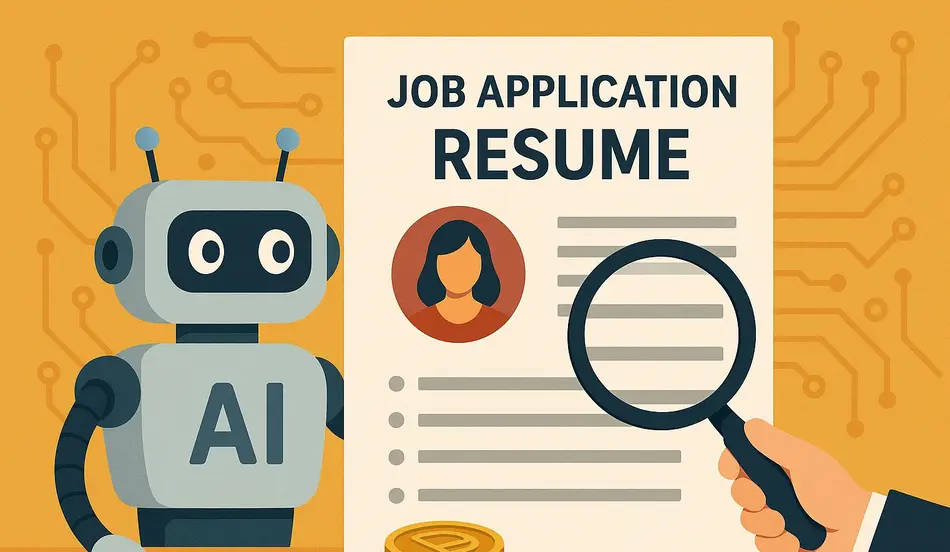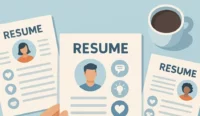Introduction
AI tools like ChatGPT, Gemini, and Claude are transforming how job seekers write resumes in 2025. What used to take hours—brainstorming achievements, formatting sections, and rewording responsibilities—can now be done in minutes with a single prompt. But while AI can make resume writing faster and easier, it can also introduce subtle risks that may hurt your chances of landing a job if you’re not careful.
In this article, we’ll break down how AI tools can help or hurt your resume, offer best practices for using them wisely, and share examples of AI-generated resume content—both good and bad.
How AI Can Help Your Resume
1. Saves Time and Reduces Overwhelm
Writing a resume from scratch is stressful—especially if you’re not sure where to start. AI tools like ChatGPT can instantly:
- Suggest bullet points based on your job title
- Recommend relevant skills for your industry
- Create clean formatting outlines or templates
- Rewrite sections to sound more professional
Example Prompt:
“Write 5 bullet points for a Sales Manager resume that show strong leadership and sales growth.”
This kind of automation helps job seekers overcome writer’s block and focus on content quality.
2. Tailors Your Resume to Specific Job Descriptions
AI excels at matching your resume to a job listing. You can paste a job ad into ChatGPT or Gemini and ask it to:
- Suggest relevant keywords
- Highlight skills you should emphasize
- Rewrite your summary or experience to align with the role
Example Prompt:
“Tailor this resume summary to match the job description below. The job emphasizes CRM, B2B sales, and remote team management.”
This boosts your chances of passing ATS (Applicant Tracking Systems) filters and catching a recruiter’s eye
3. Improves Clarity and Professional Tone
Not everyone is a confident writer. AI tools help refine your language, remove fluff, and make your resume sound more polished without losing your unique voice.
Before (raw version):
“Did stuff with Excel and made some reports every month. Helped my boss figure out trends.”
After (AI-enhanced):
“Created monthly Excel dashboards to analyze sales trends and presented insights to management for strategic decision-making.”
Much better, right?
4. Recommends Industry-Specific Skills and Achievements
Many AI platforms are trained on job market data. Tools like Resume Worded, Teal, or Rezi can identify high-impact phrases and skills relevant to your field and experience level. This helps you:
- Highlight in-demand skills
- Show results with metrics
- Use keywords recruiters are searching for
5. Checks for Formatting, Grammar, and ATS Compliance
AI writing tools can flag passive voice, vague language, or formatting issues. More advanced resume platforms even scan your resume for ATS compatibility and recommend improvements.
How AI Can Hurt Your Resume
1. Overused, Generic Language
AI tools often generate templated phrases like:
- “Results-driven professional…”
- “Excellent communication skills…”
- “Team player with a proven track record…”
While technically correct, they’re also bland, overused, and easily ignored. Recruiters see hundreds of resumes with the same phrasing.
Fix: Use AI to generate drafts, but personalize and rewrite them in your own voice. Make your experience sound human.
2. Inaccurate or Exaggerated Claims
AI can make things up if your prompt isn’t specific. For example:
“Write achievements for a software engineer in fintech.”
You might get:
- “Reduced code errors by 95%”
- “Launched a new AI-based trading algorithm that increased revenue by $2M”
If these aren’t true, they can backfire in interviews or even be flagged as dishonest.
Fix: Always edit AI content to reflect your actual accomplishments.
3. Awkward or Robotic Tone
AI sometimes writes in a tone that feels unnatural or overly formal. Resumes should be professional but also conversational and clear.
AI Example:
“Leveraged synergistic capabilities to optimize stakeholder alignment.”
Better Human Version:
“Worked with cross-functional teams to align priorities and improve collaboration.”
4. Poor Formatting or Visual Layout
Most general AI tools (like ChatGPT) don’t format resumes properly unless prompted very specifically. You could end up with:
- Misaligned bullet points
- No consistent font styling
- Inconsistent section headers
Some AI resume builders try to fix this, but they may output PDF-only formats that break ATS rules.
Fix: Use a resume-specific platform (like Teal, Novoresume, or Rezi) or copy AI content into a professional Word or Google Docs template.
5. Over-Reliance = Lack of Originality
Your resume should reflect your unique value, not just what an algorithm says. Overusing AI makes you sound like everyone else—and that’s the opposite of what you want.
Use AI as a starting point, not the final product.
Good vs Bad AI-Generated Resume Content (Examples)
Good Example (AI-assisted, human-edited):
Marketing Specialist – ABC Corp
- Launched a new email campaign that increased open rates by 43%
- Conducted A/B testing to optimize landing pages, boosting conversions by 22%
- Collaborated with product team to refine go-to-market strategy
Bad Example (AI-only, no edits):
Marketing Specialist – ABC Corp
- Responsible for marketing duties
- Proven team player with communication skills
- Increased success metrics and helped improve brand
The second version is vague, cliché, and lacks metrics. Always review what AI gives you.
Best Practices for Using AI in Resume Writing
Start with your real experience. Input accurate, detailed prompts.
Edit every output for tone, truthfulness, and relevance.
Use AI to rephrase, not fabricate.
Don’t copy and paste without reviewing the results.
Use job descriptions to guide your AI prompts for better tailoring.
Recommended Tools in 2025
| Tool | Best For | Caution |
|---|---|---|
| ChatGPT | Drafting content, summarizing experience | Needs formatting manually |
| Rezi | ATS-compliant resume building | Limited design control |
| Teal | Resume tracking, job-specific tailoring | Requires signup |
| Resume Worded | Skill match analysis, optimization tips | Freemium model |
| Zety | Templates + writing suggestions | May feel too templated |
Conclusion
AI tools like ChatGPT and others can dramatically simplify the resume-writing process—but only when used wisely. They’re great for beating writer’s block, identifying keywords, and structuring your resume. But if you blindly copy-paste AI content without edits, you risk sounding robotic, generic, or even dishonest.
The smartest approach in 2025? Use AI for efficiency. Use your voice for authenticity.






